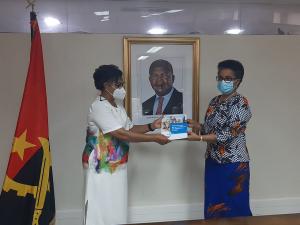WHO Angola support to the Education sector to improve School Health.
Luanda, 07th June 2021 – The WHO Representative in Angola, Dr. Djamila Cabral, met in Luanda the Minister of Education of Angola, Dr. Luísa Grilo, to whom she addressed issues related to the cooperation with WHO, on the availability to support the country in developing a robust school health plan.
According to the Minister of Education, Dr. Luísa Grilo, health represents a fundamental pillar for the education system, in particular for school development and achievement, the joint work with WHO and the Ministry of health is covered it is very important for the improvement of education in the country.
“In times of COVID-19 pandemic, we mustn’t forget the issues of school health and the need to build robust programs that include, among others, reproductive sexual education, malaria, the promotion of healthier lifestyles and other elements that serve to prevent diseases in the future”. said Dr. Luísa Grillo.
Based in the Ministry of Education data, endemic diseases in the country, particularly malaria, represents the main causes of school absenteeism, which has been compromised children's learning.
In response to this situation, the Ministry of Education has been working with the health sector and partners to carry out actions to fight childhood diseases, as well as awareness to children about the importance of washing hands with soap and water, reproductive health and prevention of early pregnancy.
The support from WHO for the development and implementation of a robust school health program is welcome. The Ministry of Education and WHO agrees that it is necessary to create conditions for students to have access to disease prevention and health promotion services, including periodic assessment of hearing and vision, awareness and monitoring of children and communities in order to adopt healthy lifestyles and nutrition, as well as strengthening access to primary health care for students and their communities.
Dr. Djamila Cabral, highlighted that WHO is pleased to work together with the Ministry of Education, to promote health and well-being programs for students and their families.
“WHO has extensive experience in working with the education sector, in terms of training teachers to include contents on disease prevention and health promotion, and at school health level for a general approach to promoting children, teenagers and young people's health. Therefore, it will be an honor for us to work with the Ministry of Education of Angola, to improve health in schools and well-being of communities”
Currently, within the framework of the Covid-19 pandemic, WHO in collaboration with the Ministry of Health and other partners, has been supporting the Ministry of Education in the preparation of the proposal for the National Action Plan to keep schools open and safe, in order to avoid a greater impact of school closures on learning, as well as on deworming campaigns for school-age children (5-14 years old), carried out in communities and primary schools.
The meeting was also an opportunity for the WHO Representative to inform the Minister of Education about the process for the elaboration of the Country Cooperation Strategy (CCS) between WHO and Angola, in which the participation and contribution of partners, namely the Ministry of Education, will be fundamental for the definition of WHO's priorities for action in the country over the next five years.



